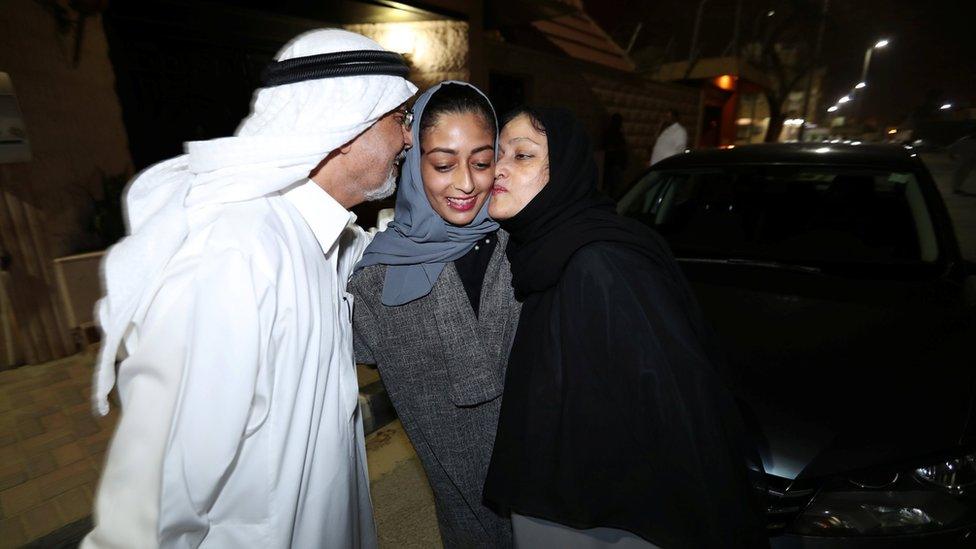Saudi Arabia's ban on women driving officially ends
- Published
(June 2018) Saudi women hit the road
Saudi women are officially allowed to get behind the wheel, after a decades-old driving ban was lifted.
The change was announced last September and Saudi Arabia issued the first licences to women earlier this month.
It was the only country left in the world where women could not drive and families had to hire private chauffeurs for female relatives.
However, the move comes amid an intensified crackdown on activists who campaigned for the right to drive.
At least eight women's rights activists are being detained and could face trial in a counter-terrorism court and long prison sentences for their activism, human rights group Amnesty says.
They include Loujain al-Hathloul, a well-known figure in the campaign for women's driving rights.
Amnesty has also called for wider reforms in Saudi Arabia, where women remain subject to male guardianship laws.
Human rights groups in the kingdom have campaigned for years to allow women to drive.
Dozens of women were arrested for driving in Riyadh in 1990 and some Saudi women began posting videos of themselves at the wheel in 2008, and between 2011 and 2014.
Thousands of women could soon take to the roads.
"It is a historic moment for every Saudi woman," Saudi television presenter Sabika al-Dosari told the AFP news agency
She said she was behind the wheel minutes after the end of the driving ban at midnight local time (21:00 GMT Saturday).

Hannan Iskandar is kissed by her parents after driving legally for the first time in Al Khobar
"Those days of waiting long hours for a driver are over," said pharmacy student Hatoun bin Dakhil, 21. "We no longer need a man."

Cheers from women, thumbs up from men
By the BBC's Orla Guerin in Riyadh
At the stroke of midnight local time, they were off.
We were taken for a spin by one of the first women to get a driving licence here. She said she was honoured and happy to drive on home soil and hadn't slept for days with excitement.
Along the way there were cheers from women and children and thumbs up from male drivers.
As some Saudi women were driving into the history books, others were in prison. Several leading activists who had challenged the driving ban were arrested last month. They have been accused of treason.
Women here may now be able to drive, but they still are not free to travel, marry, divorce or even leave prison without the permission of a male relative.
Critics say that whatever the optics, the changes taking place here still amount to baby steps.

On 5 June, 10 women became the first female licence-holders after swapping their foreign licences for Saudi ones in cities across the country.
The Saudi authorities previously said they expected about 2,000 women to have received licences by the time the ban was lifted.
Saudi woman receives driving licence as the kingdom prepares to end its ban
However some Saudi men have expressed their dissatisfaction with the change, using an Arabic hashtag on social media that translates as "You won't drive".
The lifting of the driving ban is part of Crown Prince Mohammed bin Salman's programme to modernise some aspects of Saudi society.
He has spearheaded the Vision 2030 programme to diversify the economy away from oil and open up Saudi society.
But there are still limits on what Saudi women can do.
Five things Saudi women still can't do
Saudi law enforces a strict form of Sunni Islam known as Wahhabism and is known for its gender segregation rules.
Women have to adhere to strict dress codes, and must not associate with unrelated men. If they want to travel, work or access healthcare, they must be accompanied by a male guardian or have their written permission.